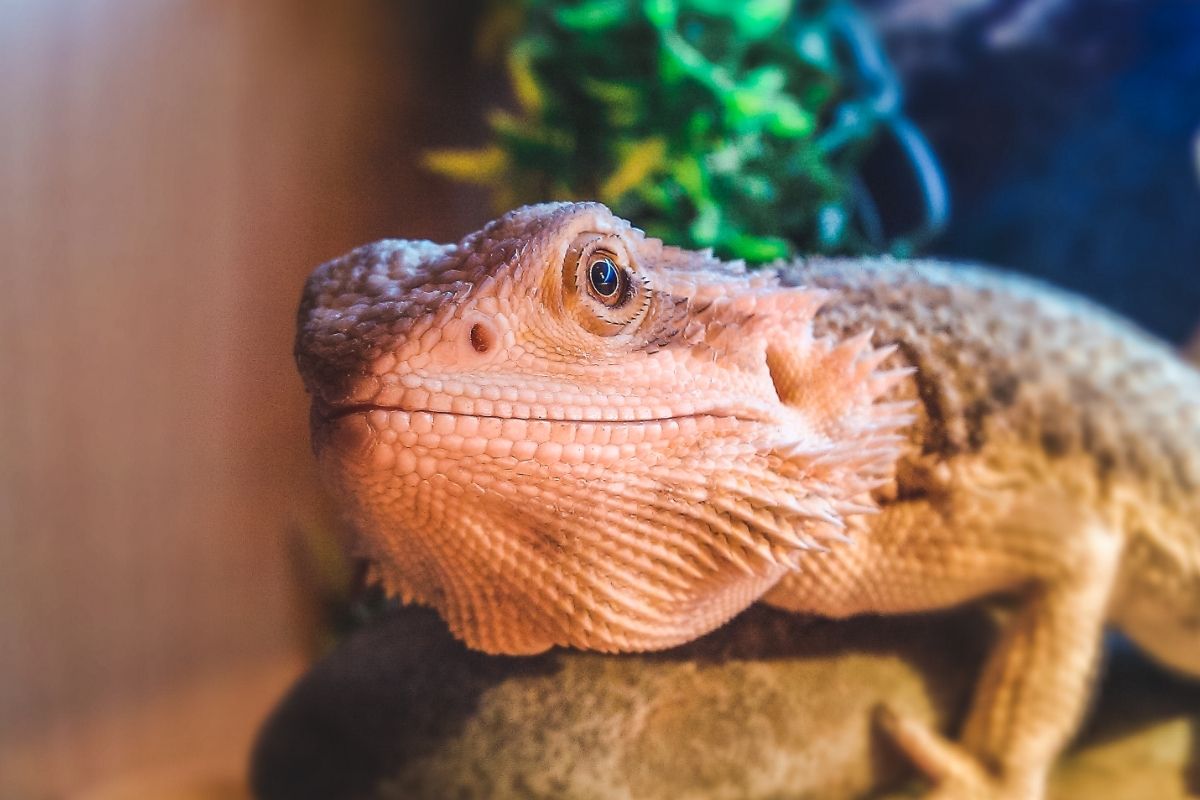Bearded dragons are adorable little reptiles that come from Australia. They look similar to lizards, but they are actually closer to snakes. These animals are very friendly and love to play around.

Bearded dragons are known for their unique appearance. Their skin has scales that resemble hair or fur, giving them a beard-like appearance. This feature makes them appear cute and cuddly.
However, some people believe that these creatures can cause allergic reactions. So is there any truth in this? Let’s find out!
What Are Allergies?
Allergies are immune system disorders that occur when your body overreacts to substances called allergens. The most common types of allergies include hay fever, food allergy, insect bites, poison ivy, and asthma.
People who have allergies often suffer from itchy eyes, runny nose, sneezing, coughing, and even breathing problems. In more serious cases, the symptoms may be life-threatening.
We see lots of people across the globe dying each year because of allergies and serious reactions to their allergies.
The Different Types Of Allergies
There are two main types of allergies: Type I and type II. Both types affect the same part of the body — the immune system. However, they differ in how they occur.
Type I Allergies
Type I allergies usually happen after exposure to a particular allergen. You’re exposed to the substance once, and then you develop an allergy to it.
Type II Allergies
Type II allergies are caused by constant exposure to a certain allergen. It happens when your immune system becomes tolerant to the allergen. When this happens, your body no longer reacts as strongly to it.
In both cases, the immune system releases antibodies against the allergen. But with type I allergies, your body produces IgE antibodies. With type II allergies, however, your body produces IgG antibodies.
How Do Allergies Affect Your Health?
When you have allergies, your immune system goes into overdrive. This causes inflammation, which affects your health in different ways. Some of the effects include:
- Itching
- Sneezing
- Runny Nose
- Coughing
- Wheezing
- Fatigue
- Headaches
What Are Some Common Allergies?

Hay fever is one of the most common allergies. According to the National Institute of Environmental Health Sciences, about 40 million Americans experience this condition at least once in their lifetime.
Hay fever is also known as seasonal allergic rhinitis.
Food allergies are another common form of allergy. About 5 percent of children and 1 percent of adults have food allergies. Many of them have severe consequences if not treated properly.
Poison Ivy And Poison Oak
These plants contain chemicals called urushiols. If you touch these plants, they will cause a rash on your skin. The rash looks like hives, blisters, or welts.
Asthma
This disease involves narrowing the airways due to inflammation. Asthmatic patients experience wheezing, shortness of breath, chest tightness, and coughing.
Bee Stings And Wasps
People who are allergic to bee stings and wasp stings should wear protective clothing such as long sleeves, pants, shoes, hats, and gloves. They should also avoid contact with stinging insects.
Ticks
If you get bitten by ticks, make sure to remove them immediately. Ticks carry diseases such as Lyme disease, Rocky Mountain spotted fever, and ehrlichiosis.
Contact Dermatitis
You’ll notice red patches on your skin if you have contact dermatitis. These can appear anywhere on your body. Contact dermatitis is caused by prolonged contact with irritants such as detergents, cosmetics, lotions, and perfumes.
Other Forms Of Allergy
Some other forms of allergies include:
- Atopic dermatitis
- Allergic conjunctivitis
- Anaphylaxis
- Pollen allergy
- Pollen allergy
- Pet allergy
- Shellfish allergy
- Tree pollen allergy
- Dust mite allergy
- Mold allergy
- Fungal allergy
What Is Anaphylaxis?
Anaphylaxis is a life-threatening reaction that occurs when you’re exposed to allergens. It’s characterized by sudden swelling of your throat and tongue, difficulty breathing, vomiting, diarrhea, and fainting.
Symptoms of anaphylaxis usually begin within minutes after being exposed to an allergen. However, some people may be affected for hours or even days before showing symptoms.
Causes Of Anaphylaxis
The main cause of anaphylaxis is exposure to allergens.
The following substances can trigger anaphylaxis:
- Bees
- Beetles
- Butterflies
- Cockroaches
- Dogs
- Fleas
- Flowers
- Grasshoppers
- Honey Bees
- Lizards
- Mosquitoes
- Moths
- Nuts
- Peanuts
- Rats
- Snakes
- Spiders
- Squirrels
- Stick Insects
- Wasps
- Worms
How Do You Prevent Anaphylaxis?
Avoidance is the best way to prevent anaphylaxis. You can do this by avoiding contact with allergens.
Vaccines
There are vaccines available to protect against certain types of allergies. For example, there is a vaccine that protects against cat dander.
Medications
You can take medications to help control your symptoms and reduce your risk of developing anaphylaxis. Some of these drugs include:
- Antihistamines
- Anti-inflammatory steroids
- Epinephrine
- Inhalers
- Intranasal corticosteroids
- Oral antihistamines
- Premedication
- Preventive treatment
Prevention is better than cure! To prevent anaphylaxis, it’s important to know what triggers your reactions. This allows you to plan, so you don’t accidentally expose yourself to allergens.
If you think you might be having an allergic reaction, you should follow these steps:
- Take note of your symptoms.
- Call 911 if you need emergency medical attention.
- Seek immediate medical care
What Causes Allergies?

Allergies occur when the body’s immune system overreacts to something harmless.
The most common triggers of an allergy include pollen, pet dander, dust mites, mold spores, insects, food, medications, and other substances.
The symptoms of an allergy vary depending on what substance caused it.
Some people may experience itchiness, sneezing, watery eyes, rashes, hives, difficulty breathing, coughing, vomiting, diarrhea, fatigue, headaches, joint pain, and even swelling.
Although many people think that allergies only affect children, adults can also be affected by them. In fact, about 20% of all Americans suffer from allergies at least once a year.
If you have been diagnosed with an allergy, then it is important to know how to prevent future attacks. You should avoid allergens as much as possible, so your body doesn’t become sensitized to them.
How Do Pets Cause Allergies?
Pets like dogs, cats, birds, and ferrets can trigger allergies because they release tiny particles called “allergens” into the air.
These particles are usually found in animal saliva, urine, feces, feathers, fur, and dead skin cells. When inhaled, these particles can irritate the lungs and cause inflammation.
People who live with pets are more likely to develop allergies than those without pets. Studies show that having a dog increases the risk of developing asthma by 30%.
Having a cat doubles the chances of getting hay fever. And having a bird means twice the risk of eczema.
It is not just pets that can cause allergies. People who work with animals, such as veterinarians, groomers, zookeepers, farmers, and laboratory workers, are also at higher risk of developing allergies.
What Are Bearded Dragons?
Bearded dragons (Pogona vitticeps) are reptiles native to Australia. They are popular pets because they grow quickly and are relatively easy to keep.
Although they look cute, bearded dragons can sometimes bite or scratch their owners. If this happens, call your doctor right away.
Bearded dragons are often kept as pets because they make great companions for kids. However, they are also popular among reptile enthusiasts because they are considered one of the easiest species to breed successfully.
In addition to being a good pet, bearded dragons are also used in research studies. Scientists use them to study the development of certain diseases and conditions, including cancer.
How Do You Care For A Bearded Dragon?
Since bearded dragons are small lizards, you will want to provide them with plenty of space. This includes a large cage or terrarium.
Make sure there is enough room for your dragon to move around freely. It’s also recommended that you place a heat lamp near your lizard’s enclosure. This helps him stay warm during cold weather.
You should feed your bearded dragon a diet rich in protein. Reptiles need high-quality proteins to build strong bones and muscles.
Your bearded dragon will eat a variety of foods, but he will especially enjoy vegetables, fruits, insects, and mealworms.
Mealworms are particularly beneficial because they contain essential nutrients that help promote healthy growth.
You should clean your bearded dragon’s tank regularly. Scrubbing it out once every two weeks removes any dirt and debris from the tank. Also, be sure to change the water several times per week.
The water should be changed before it becomes too dirty.
If you notice any signs of illness, contact your veterinarian immediately. Some signs of illnesses include:
- Skin lesions
- Bleeding gums
- Difficulty breathing
- Loss of appetite
- Weight loss
- Drooling
- Vomiting
- Diarrhea
Please ask your veterinarian if you have any questions about caring for your bearded dragon. Click the image below to talk to a Veterinarian.

Do Bearded Dragons Cause Allergies?
Bearded dragons do not cause as many allergies as other pets. They tend to produce fewer allergens than other furry or feathered pets.
However, they still pose some risks for people who are sensitive to certain types of allergens.
Some people find that their allergies worsen after adopting a bearded dragon.
If this happens, you should try to identify which specific allergens are causing the problem. Then you can take steps to reduce exposure to them.
How Do Bearded Dragons Cause Allergies?

Like other reptiles, bearded dragons shed their skin every few weeks. Their skin flakes contain various proteins and fats that can trigger an allergic response in people.
These flaky skins can sometimes fall onto carpets, furniture, bedding, clothing, and shoes.
This can lead to an increase in airborne allergens in the home. It’s best to keep the reptile in its cage or tank until you get rid of the shedding.
Other factors that can contribute to allergies in bearded dragons include:
- Petting and handling
- Food and water bowls
- Cleaning supplies
- Toys
- Bedding
- Clothing
- Furniture
- Carpets
- Dust mite control
- Air quality
How Can I Prevent Allergies From A Bearded Dragon?
There are several ways to help prevent allergies from a bearded dragon. First, make sure that your new pet has no contact with any type of animal allergens.
- Keep him away from barns, stables, kennels, grooming areas, and pet stores where he could come in contact with fleas, ticks, and other pests. Also, keep him away from carpets, furniture, bedding, clothing, toys, plants, and anything else that might contain allergens.
- Second, keep him out of the bedroom. This will reduce his exposure to dust mites, cockroaches, mice, and other allergens.
- Third, keep him away from grasses, weeds, trees, shrubs, flowers, and other plants that may trigger allergic reactions.
- Fourth, don’t let him play outdoors if there’s pollen in the air. He’ll breathe in the pollen and get sick.
- Fifth, wash him regularly to remove bacteria, viruses, parasites, and other contaminants. Bathe him every two weeks to clean him thoroughly.
- Finally, watch for signs of illness. If your bearded dragon becomes ill, check his mouth and eyes carefully. If he develops sores on his tongue, nose, or throat, call your veterinarian immediately.
If you suspect that your bearded dragon is suffering from an allergy, talk to your vet about treatment options. Some medications can be used to control symptoms. Others can be given as injections.
Still, others can be applied topically. Your vet can tell you what kind of medication would be best for your pet.
Should You Adopt A Bearded Dragon If You Have Allergies?
If you have allergies, it’s probably best to avoid owning a bearded dragon. But if you’re determined to adopt one, then you need to know how to care for it properly and avoid potential allergic reactions.
- Choose a healthy bearded dragon. Make sure that the lizard looks well-fed and isn’t too thin. Avoid buying a bearded dragon that has been kept in poor conditions.
- Make sure that your pet doesn’t have any health problems. If he does, consult your vet right away.
- Keep him indoors. Don’t allow him to roam free outside. Keep him away from allergens.
- Bathe him regularly.
- Feed him a diet rich in protein.
- Provide plenty of fresh, clean drinking water.
- Keep him away from insects and rodents.
- Monitor his temperature.
- Watch carefully for signs of disease.
- Take him to the vet if necessary (if you notice any of the signs of illness listed above).
Can Bearded Dragons Be Allergic To Humans?
Yes, bearded dragons can suffer from severe skin rashes and other allergic reactions. These reactions can occur after someone touches the reptile or comes into close contact with its saliva.
In fact, bearded dragons are so sensitive to human touch that even gentle handling can lead to an adverse reaction.
Can Bearded Dragons Be Allergic To Other Pets?
Yes, bearded dragon owners sometimes report that their pets react badly to other animals. This happens most frequently with cats and dogs.
It may also happen between reptiles and birds if they come in contact with a bearded dragon’s saliva.
Conclusion
Allergic reactions are common among people who have pets. Bearded dragons are less likely to cause allergies because they don’t have fur, however, it is still possible for bearded dragons to cause allergic reactions in some people.
The most common pets that cause allergies include dogs, cats, rabbits, guinea pigs, hamsters, gerbils, rats, and fish. Other pets that can trigger allergies include horses, birds, reptiles, and amphibians.
People who work around animals are also more likely to suffer from allergies. These include veterinary technicians, zoologists, animal handlers, farmers, and laboratory assistants.
The number one way to avoid allergies is to keep your pet away from allergenic sources. You can also minimize your pet’s exposure by keeping it indoors during times when pollen counts are high.
Finally, you can treat your pet’s symptoms once they develop.
Frequently Asked Questions
How Can I Prevent My Bearded Dragon From Getting Sick?
You can help prevent your bearded dragon from getting sick by keeping him safe from possible allergens. This means avoiding certain foods and cleaning products that may trigger an allergic reaction.
Also, keep him out of areas where there are lots of dust mites. Dust mites thrive in warm, humid environments like basements and attics.
Finally, make sure that your pet gets regular veterinary checkups. That way, you’ll be able to catch any problems early on.
Should Children Have Bearded Dragons?
The American Academy of Pediatrics recommends that children under five years old not have pets at all.
Children who do own pets should limit their exposure to them. The same goes for people with asthma and other respiratory illnesses.
Bearded dragons aren’t suitable pets for young children because they can be aggressive when handled by small children.
That said, bearded dragons are great companions for older kids. They’re easy to care for and can become good friends for anyone willing to put in some time.
Where Can I Find More Information About Pet Allergies?
You can find more information about pet allergies on the Web sites below:
– American Society for Veterinary Clinical Pathology
– Center for Food Safety and Applied Nutrition
– Centers for Disease Control and Prevention
– National Institute of Health
– WebMD
– Petfinder
